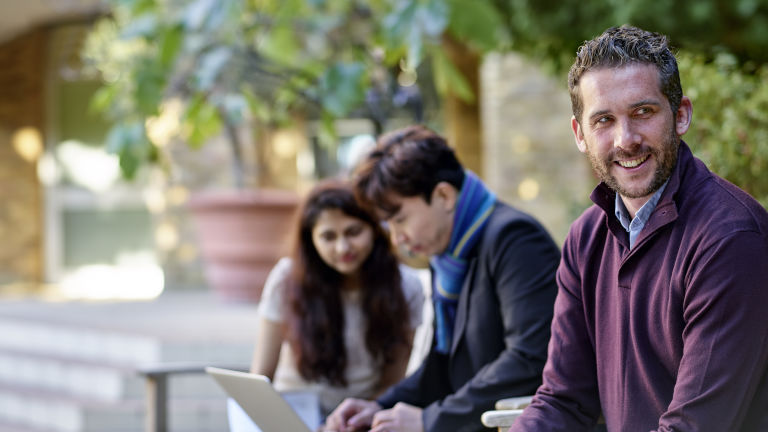
Sustainability Leadership and Corporate Responsibility
Master the fundamentals of sustainability and corporate responsibility. Turn global challenges into sustainable growth opportunities and achieve a positive impact with your business.
SLCRPlease enter a keyword and click the arrow to search the site
Or explore one of the areas below
From sustainable superfoods to national energy supply, from waste reduction to carbon management – these LBS alumni show us how it’s done

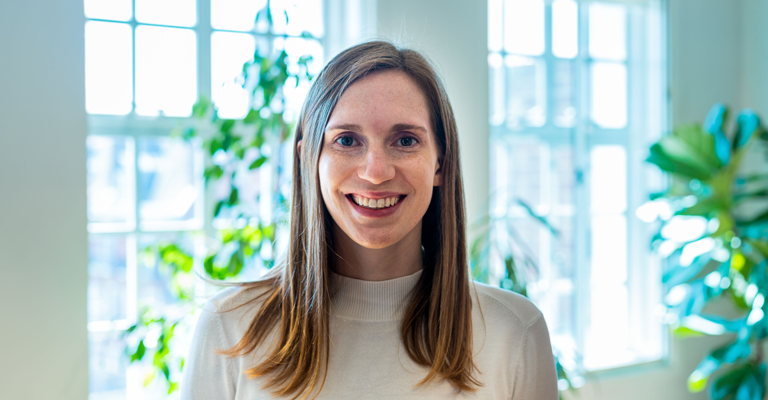
Caroline Williams
Co-Founder, junee
MBA2021
Discover fresh perspectives and research insights from LBS
“Moving from a linear to a circular economy isn’t easy. It all starts by making it convenient for people to change their habits”
“Isn’t it crazy we used to throw things away after just one use?” is something we believe everyone will be saying by 2030. The UK currently generates 11 billion pieces of packaging from on-the-go lunches every year; something junee is striving to change. I co-founded the company in 2020 with Mary Liu, a fellow MBA classmate who I met at LBS. Our mission is to replace 25 million single-use takeaway containers by 2025 by working with offices and local restaurants, creating a partnership where workers can opt for a reusable bowl when buying their lunch. People eat their meal wherever they like and drop off the bowl in their office at a junee return bin. We then come in to collect it and send it to our washing partner, where the bowls are cleaned, stored, and redistributed when restaurants are low on stock.
My passion for sustainability began at the age of 16 when I took environmental studies at high school. I loved the broad, global aspect of it and found it fascinating how the way we interact with the natural world impacts every aspect of our lives. During my career at Deloitte in Chicago as an M&A associate, I was always the person bothering our facilities manager about the fact that we had compostable cups yet no composting bins. I went on to found our office sustainability team with a colleague, which I really enjoyed, and so what started as a side passion soon became something I wanted to focus on in my career.
I used the MBA as a chance to make that transition. It gave me the time to think about what I wanted to do, the skills and knowledge I needed to lead a business and the network to get it off the ground. The first inspiration for junee was actually born from LBS’s Hackathon – a two day event where teams are put together to develop an MVP solving a problem. I came in wanting to tackle the single-use packaging challenge, and my team pitched an early version of what has since become junee. Though we didn’t win, one of the judges came up to me after the competition and encouraged me to pursue the idea.
Launching during the COVID-19 pandemic has been eye-opening; it’s showed just how much things have changed. With people working from home and many offices adopting a hybrid approach, companies want their workplace to feel different to what it was before. They’re trying to create a socialising space as it’s no longer productive to come in and sit on calls all day. Time in the office is now about collaboration and bonding with colleagues, and going out for lunch is a huge part of that – which presents a perfect opportunity to start being more mindful about the container your food is housed in.
We’ve reached a point where everyone needs to start paying more attention to sustainability; for businesses this has made their relevant challenges all the more urgent. Because of this, we’ve had a very positive reception to our mission. It’s been great to see so many organisations interested in getting on board; funding a sustainable initiative that reduces waste and allows their employees to make eco-friendly decisions. Taking these small steps is what will ultimately contribute to a shift in mindset – moving from a linear to a circular economy isn’t easy, but it all starts by making it convenient for people to change their habits.
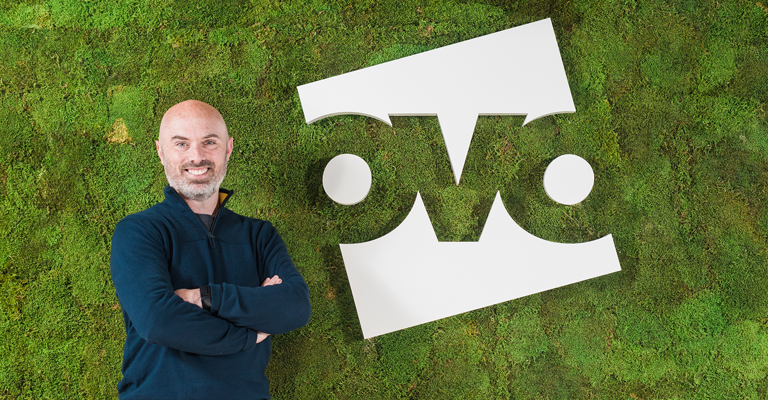
Ben Blake,
General Manager and Chief Commercial Officer, OVO
MBA2011
“Reaching net zero is a bit like surfing, timing is everything. If you go early you’ll be ahead of the wave. If you go too late you’ll miss it all together”
I’ve always had personal concerns about resources and how the world can continue operating as it does. Towards the end of 2020, OVO approached me about joining their retail business, and I thought back to when I attended LBS’s MBA programme in 2009 and listened to a guest speaker who had reluctantly started working with Walmart. He spoke about sustainability, and how for years prior to being appointed to Walmart’s board, he’d been fighting them on what he perceived as their environmentally damaging practices. After joining, he instantly helped Walmart reduce water consumption used in the production of their laundry detergent. This really stuck with me; it showed you can have a much bigger impact from the inside. I knew that being a part of OVO would allow me to come up with solutions, and so I joined in November 2020.
Rather than sustainability being an aspect of our business, it’s embedded into our operations, people and culture. Today, OVO is on a mission through its sustainability strategy, Plan Zero, to tackle the most important issue of our time – the climate crisis – by bringing our customers with us on the journey towards zero carbon living. OVO Energy has committed to being a net zero carbon business and to achieving bold science-based carbon reduction targets by 2030, while helping members halve their carbon footprint at the same time.
On an operational level, we’ve committed to changing our entire van fleet to electric vehicles by 2025. Logistically, taking nearly 100 vans off the road every month is a huge challenge, as is accessing suitable levels of charging ports. But an important reminder for all organisations is to think about the long term gains that outweigh the short term losses. Leading the way with an operation of this scale will encourage other businesses to convert to electric vehicles, and as a result the charging infrastructure will improve, accelerating the replacement of other fleets.
The knowledge I took from LBS on behavioural science and decision making has been key to everything I do at OVO. We’re trying to encourage people to make positive changes to their lifestyles. This has been key to our strategy as a business; we’ve invested in creating innovative tariffs that makes car charging greener and reduces charging costs by up to 70%. At the start of 2021 OVO Energy trialled another new innovation and the world’s only tariff of its kind. The new innovative smart tariff launched nationwide in August 2021 and makes car charging greener and reduces charging costs by up to 70%. OVO Drive + Anytime is the world’s only ‘type of use’ energy tariff - splitting home energy costs from EV charging costs. OVO Drive + Anytime protects EV users against price spikes and higher charges by guaranteeing a low price for smart EV charging throughout the day, enabling members to drive for a year for £100.
From a stakeholder and investor point of view, this makes us more interesting, as the focus on creating future proof technology demonstrates growth. For consumers, they like to see companies doing something to help make their lives easier and greener as we transition to net zero, so that by association they’re playing their part.
Organisations need to understand that governments, investors and consumers hold a lot of the power. It’s key to anticipate what they want and when government policies and consumer choices are going to shift; that’s where real sustainable commercial opportunity lies. Reaching net zero is a bit like surfing, timing is everything. If you go early you’ll be ahead of the wave. If you go too late you’ll miss it all together.
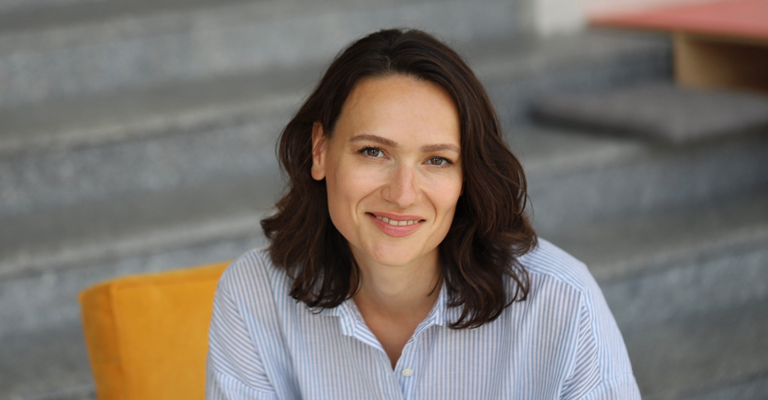
Irina Turcan,
Co-founder, Erbology
MiM2010
“Sustainability is a business opportunity. It’s a driver for the younger generation, and it’s getting to the point where Gen Z aren’t going to accept anything less than sustainable business practices.”
I founded Erbology in 2016 with my brother Victor. We are a thought leader in plant-based nutrition, taking powerful plants and transforming them into accessible, everyday foods.
Nature has always played a big part in my life. I’m from Moldova and spent my summers in the Bessarabian countryside; a fertile region plentiful in walnuts, plums, grapes, sour cherries and forest nuts. I feel fortunate to have grown up around such wonderful natural ingredients, but as I got older, this made me more aware of the declining state of the food production industry.
Erbology takes influence from our childhoods; we wanted to share the wholesome ingredients we grew up with while providing an alternative to the damaging processes commonly used in the food industry. My grandfather had worked on fields where conventional farming practices were used, and the chemicals and pesticides were detrimental to his health. At Erbology, we chose to be 100% organic. Organic farming is better for the soil, the wildlife, the farmer and the consumer.
Sustainability runs through every decision we make in how we create and source our products. We’re proud of the work we do with independent organic farmers in communities in rural India, Southern Italy and Transylvania in Romania, to name a few regions. We sought out small farms run by people who care for their land and love their craft. Our almond supplier is a young couple from Puglia who have taken over the land from their grandparents; they’re passionate about growing nuts through traditional methods, free from chemicals or pesticides.
By paying them a fair price and striking up an ongoing business relationship, it allows them to continue what they’re doing without having to change their practices. This keeps the quality of the product at the highest level possible. This also ensures economic sustainability and acts as an alternative to large companies who focus on yield; producing food at the expense of the environment by using intensive farming and processing methods.
Our focus is to encourage people to pursue a healthier lifestyle and feel good. Sustainability is built into the backbone of our mission. For example, we produce a range of snacks using a raw process under 42ºC to preserve nutritional value. We also activate all the seeds and nuts to make our snacks even more gut-friendly. From a health perspective, this is one of the most sustainable ways to make snacks. We’re pushing things further by investing in research to make our packaging 100% compostable.
It’s these different angles that make our business attractive to consumers; they are paying a fair price, and they know what we offer has been ethically produced and is of the highest quality. Sustainability is a business opportunity. It’s a driver for the younger generation, and it’s getting to the point where Gen Z aren’t going to accept anything less than sustainable business practices. So, in the not too distant future organisations who fail to get on board will risk being left behind.
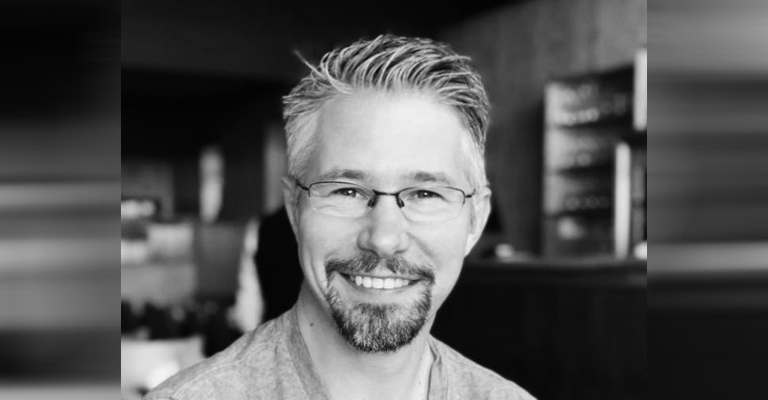
Mark Chadwick
Managing Director, ENGIE Impact
EMBA2006
“We used to receive around 100,000 applications from prospective candidates every year. Since committing to low carbon, we now receive between 700,000 and 800,000 applications a year”
After spending 16 years in the industry, I’ve seen sustainability go from an afterthought to one of the most pressing topics in business. In 2005 I started Carbon Clear – a carbon management firm that helps businesses and individuals control their carbon impact. We launched shortly after my wife fell pregnant, which was the first time I’d really started to think about sustainability. I’d been aware of climate change for some time, but the prospect of becoming a father really made me concerned about the long-term issues facing society.
Our work focussed on performing carbon audits, providing emissions reduction advice, and investing in high quality carbon offset projects around the world. It took a while to get the business going; back in 2005 it was like ice-skating uphill, people didn’t understand what I was doing or why I was doing it. A lot of our clients were businesses looking to market themselves and differentiate from their competitors by engaging with carbon targets. Despite this, the fact they were engaging was more important than why.
It was a slow start which only became more difficult through the financial crash in 2008. We kept the business afloat by adding an advisory arm, helping organisations to cut carbon and cut costs; by 2011 we started growing 40% year on year. By 2017 we had 25 of the FTSE100 companies in our client base, offices in different locations around the world and had rebuilt ourselves as a market leader for corporates looking to measure, report and manage emissions.
I sold the business in 2017 to EcoAct and spent a few years doing an earn-out before being approached by ENGIE Impact in 2019, which I joined as Managing Director. It’s interesting to see how the industry has changed in 14 years. At the start of my career, I was trying to raise awareness of issues and increase transparency. Today in my role at ENGIE Impact the focus is on taking action; looking at how businesses are going to deliver on their targets and accelerate sustainability transformation.
There is huge momentum in the sector, for example, between March and June of 2021, the number of pledges from companies for net zero targets rose from 1,000 to 3,000. For executive teams looking to drive sustainability further up the boardroom agenda, that’s a very compelling statistic to put in front of your organisation. When looking at taking action on an initiative, you need to know what your investors think and anticipate how it will resonate with your customers. Sustainability targets generally improve your longevity which will be attractive to investors and customers are always happy to engage in sustainable initiatives by association. Finally, you need to think about your employees. In 2021, you’ll struggle to attract young talent without having a link to sustainability. When ENGIE Impact was still rooted in fossil fuels, we used to receive around 100,000 applications from prospective candidates every year. Since committing to low carbon, we now receive between 700,000 and 800,000 applications a year, which shows the power of being on the right side of the sustainability picture

Master the fundamentals of sustainability and corporate responsibility. Turn global challenges into sustainable growth opportunities and achieve a positive impact with your business.
SLCR
Master the fundamentals of sustainability and corporate responsibility. Turn global challenges into sustainable growth opportunities and achieve a positive impact with your business.
SLCR